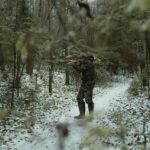Yes, hunting can be considered a hobby for many people. According to the National Survey of Fishing, Hunting, and Wildlife-Associated Recreation, 6% of U. S. residents 16 and older participated in hunting as a recreational activity.
Hunting as a hobby offers various forms and experiences, including waterfowl bird hunting, upland bird hunting, turkey hunting, predator hunting, and small game hunting.
In addition to the thrill of the hunt, hunting often involves spending time outdoors in natural environments, which can promote feelings of calmness, relaxation, and connectedness with nature, making it a fulfilling hobby for many enthusiasts.
Check out this Youtube video: “Hunting Is Not a Hobby Its An OBSESSION! – YouTube” and learn about the passion and dedication that goes into the world of hunting.
The Versatility of Hunting as a Hobby
Hunting is a hobby that offers a myriad of different methods to pursue. Whether it’s through archery, muzzleloading, or using modern firearms, hunters have a variety of tools and tactics at their disposal.
Each method brings a unique experience and requires different skills, making hunting a versatile and engaging leisure activity.
Different Methods of Hunting
Hunting presents a diverse range of methods, including still hunting, stand hunting, stalk hunting, and spot-and-stalk hunting. Still hunting involves slow, careful movement through the woods, while stand hunting requires the hunter to remain stationary in a covered or concealed location, like a tree stand.
Stalk hunting involves pursuing game on foot, and spot-and-stalk hunting combines spotting game from a distance and then stalking within shooting range. Each method caters to different preferences and hunting environments, showcasing the versatility of hunting as a hobby.
Hunting with Various Weapons
Hunters have the option to utilize various weapons, including rifles, shotguns, bows, and muzzleloaders. Each weapon type demands distinct skills and techniques, offering hunters the opportunity to master different forms of marksmanship and precision.
For instance, archery hunting requires close-range accuracy and patience, while firearm hunting demands control and precision at varying distances. This wide selection of weapons adds intrigue and adaptability to the hunting experience, further establishing it as a versatile hobby.
Adapting to Different Game and Habitats
The hunt for diverse game in different habitats adds an element of versatility to hunting. Whether pursuing whitetail deer in dense forests, waterfowl in marshlands, or antelope in open plains, adapting to various game and terrains demands different approaches and strategies.
Understanding the behavior and habitat of each species becomes essential, making hunting an intellectually stimulating and ever-changing pursuit.
| Game | Habitat |
|---|---|
| Whitetail Deer | Dense Forests |
| Waterfowl | Marshlands |
| Antelope | Open Plains |
Hunting as a hobby epitomizes versatility through its diverse methods, weapon choices, and adaptability to different game and habitats. This multifaceted pursuit offers hunters a range of experiences and challenges, ensuring continued engagement and enjoyment.
Getting Personal with Nature
Connecting with the Outdoors:
When it comes to connecting with the outdoors, there are various hobby options that individuals might embrace to truly immerse themselves in nature. Whether it’s hiking through lush forests, tent camping beside a serene lake, or bird watching in a local park, engaging with the great outdoors provides an opportunity to connect with the natural world.
However, it’s important to note that understanding and respecting the environment is essential as it ensures a harmonious relationship with nature.
Enjoying the Serenity of Nature
Enjoying the serenity of nature offers a chance for peaceful introspection and relaxation. For many, it’s a respite from the hustle and bustle of modern life, allowing them to find solace in the tranquility of natural surroundings.
Activities like meditation in a serene forest clearing, practicing yoga on a quiet beach, or simply sitting by a gently flowing stream can provide a sense of calm and rejuvenation. This connection with nature not only enhances mental well-being but also cultivates a deeper appreciation for the world around us.
Immersing Oneself in the Wild
Immersing oneself in the wild can mean more than just observing nature from a distance. It might involve activities such as wildlife photography, nature sketching, or participating in conservation projects.
Engaging in these pursuits not only establishes a stronger bond with the natural world but also contributes to preserving and protecting the diverse ecosystems around us.
Hunting as a Means of Physical Fitness
Staying Fit and Active
Hunting is not just a pastime; it’s a rigorous physical activity that keeps enthusiasts fit and active. As hunters navigate through varied terrains, climb steep slopes, and track prey, their bodies engage in continuous movement and exercise, demanding both muscular and cardiovascular endurance.
The sheer act of navigating through rugged terrain, alongside periods of stillness and sudden bursts of activity, keeps hunters on their toes. This constant physical engagement makes hunting an ideal means of staying fit and active without the monotony of traditional gym workouts.
Aside from the physical demands, the mental fortitude required during hunting further contributes to overall well-being. The focus and concentration needed to track, identify, and accurately aim at prey enhance cognitive sharpness and decision-making abilities.
As hunters immerse themselves in nature, the mental benefits of reduced stress and anxiety, along with the sense of accomplishment, contribute to an overall feeling of well-being.
Beyond being a recreational pursuit, hunting is an exceptional physical endeavor that holistically contributes to fitness and mental agility.
The Physical Demands of Hunting
The physical demands of hunting are multifaceted and rigorous. Terrain plays a vital role in shaping the challenges encountered during a hunt.
From dense forests to expansive open fields, each landscape brings unique physical challenges. This requires hunters to exhibit strength, agility, flexibility, and endurance.
The need to traverse uneven and sometimes challenging terrain necessitates a strong core, stability, and muscular endurance.
Furthermore, hunting often involves carrying backpacks, firearms, and other essential gear, adding an additional weight-bearing component to the activity. The act of carrying these items for extended periods strengthens the upper and lower body muscles.
Hunters also need to adapt to varying weather conditions and remain physically resilient throughout. In essence, hunting is a holistic physical experience that engages the entire body and mind.
Health Benefits of Engaging in Hunting
The health benefits of engaging in hunting extend beyond physical fitness. Hunting promotes cardiovascular health, enhances muscular endurance, and improves overall strength.
Engaging in regular hunting activities contributes to weight management and metabolic health. As hunters trek through challenging terrains, their bodies engage in continuous movement and exercise, leading to enhanced cardiovascular fitness.
Moreover, the mental fortitude developed through hunting facilitates stress reduction and improved cognitive function. The sense of accomplishment associated with a successful hunt positively impacts mental well-being and instills a profound connection with nature.
Additionally, the consumption of lean, organic meat procured through hunting provides a direct nutritional benefit, enriching the diet with high-quality protein and essential nutrients.
Hunting is not just a hobby; it is a powerful and comprehensive means of promoting physical and mental well-being.
| Physical Benefit | Description |
|---|---|
| Muscle Endurance | Developed through extended periods of movement and carrying gear, enhancing overall muscular resilience. |
| Cardiovascular Fitness | Achieved through continuous exertion while navigating challenging terrains, strengthening heart and lungs. |
| Stress Reduction | The mental focus required during hunts aids in reducing stress levels, promoting an overall sense of calm. |
| Nutritional Contribution | Hunting provides access to organic and lean sources of meat, enriching the diet with essential nutrients. |
| Holistic Well-being | The combination of physical exertion, mental focus, and connection with nature contributes to overall wellness. |
Making New Friends through Hunting
Hunting is more than just a hobby; it’s a remarkable avenue for building camaraderie and forming meaningful friendships within the hunting community. The shared experiences during hunting adventures foster a unique bond and create lasting connections among individuals with a shared passion for the sport.
Building Camaraderie in the Hunting Community
The hunting community provides a setting tailor-made for forging strong camaraderie. Whether it’s swapping stories around a campfire, strategizing in a hunting blind, or celebrating successful hunts, these shared experiences create an environment conducive to forming deep and lasting bonds.
This camaraderie is further strengthened by the mutual respect, trust, and reliance that come with navigating the challenges of the hunt together.
Engaging in hunting with like-minded individuals can lead to lifelong friendships, creating a support system that extends beyond the hunting season. The thrill of the chase, the triumphs, and the occasional setbacks all contribute to creating an unbreakable bond of camaraderie within the hunting community.
Joining Hunting Clubs and Leases
Joining hunting clubs and leases presents an excellent opportunity to expand one’s social circle within the hunting community. Local hunting groups and online forums are valuable resources for connecting with fellow hunters and gaining access to hunting leases.
Engaging in discussions, sharing experiences, and actively participating in these platforms can lead to new friendships and partnerships centered around a shared love for hunting.
Hunting clubs often organize group hunts, social events, and educational sessions, offering a platform for hunters to come together, share knowledge, and build strong relationships. Additionally, securing a hunting lease allows individuals to interact with landowners and fellow lessees, fostering a sense of community and solidarity while pursuing their hunting endeavors.
Creating Connections through a Shared Hobby
Hunting serves as a powerful catalyst for creating connections through a shared hobby. It provides a platform for individuals to discover common ground, share their experiences, and form lasting friendships based on their mutual love for the sport.
The social dynamics surrounding hunting promote inclusivity, respect, and a sense of belonging, thereby establishing a conducive environment for cultivating genuine friendships.
Furthermore, developing a shared hobby such as hunting with others can bridge personal differences, reduce conflict, and strengthen the sense of teamwork and unity. Engaging in this shared pursuit enables individuals to bond over their passion for hunting, fostering connections that extend beyond the hunting grounds and enriching their social lives.
Hunting is not just a pastime; it’s a gateway to forming deep, meaningful connections and friendships. The hunting community offers a supportive and inclusive environment where individuals can build lasting camaraderie, expand their social networks, and create enduring bonds through a shared passion for the sport.
| Benefits of Joining Hunting Clubs and Leases |
|---|
| Access to prime hunting locations |
| Shared knowledge and expertise |
| Opportunities for group hunts and events |
| A sense of community and belonging |
| Networking with like-minded individuals |
Finding Peace and Solace in Hunting
Hunting, a tradition deeply rooted in human history, has evolved into more than just a hobby. The experience of venturing into the wild, braving the elements, and patiently waiting for the perfect shot encapsulates tranquility like no other. The act of hunting, in its essence, is a pursuit of peace amidst the rugged terrain, offering a sanctuary away from the chaos of modern life.
The Tranquility of the Hunting Experience
The tranquility of the hunting experience is an immersive journey into nature’s unspoiled beauty. The serene and unblemished wilderness holds an allure that captivates enthusiasts, providing an escape from the relentless pace of daily life.
In this pursuit, the tranquil surroundings envelop hunters in a cocoon of stillness, allowing for profound contemplation and introspection.
Moments of Reflection in the Wilderness
The hunting expedition offers rare moments for reflection amidst the untamed wilderness. As hunters navigate the varied terrain, an air of calmness envelops them, providing an emotional and mental retreat.
These moments become opportunities for self-reflection, fostering a deep connection with nature and offering a chance to detoxify from the anxieties of modern existence.
Enjoying the Calmness of the Outdoors
The calmness of the outdoors is a respite from the incessant clamor of urban life. Engaging with nature in this manner not only exemplifies a lifestyle but also provides profound tranquility. The sprawling expanse of unspoiled land offers hunters a unique avenue to find solace, comfort, and peace as they immerse themselves in the natural world.
Hunting for Food: A Sustainable Practice
Hunting can be a highly sustainable practice when it comes to providing for oneself through hunting. The great thing about hunting for food is that it directly connects you to the source of your food.
By hunting, you have the opportunity to source your own meat straight from nature, ensuring it’s free from hormones, antibiotics, and other additives often found in commercially raised animals. This not only provides you with a sense of self-sufficiency but also reassures the quality and origin of the food you consume.
Providing for Yourself through Hunting
When providing for oneself through hunting, it’s a direct and simple means of procuring food. Instead of solely relying on supermarkets or other suppliers, you take matters into your own hands, ensuring that your food is not only fresh but also ethically sourced.
This direct involvement in sourcing your meals establishes a deeper connection to the food you consume, allowing you to appreciate the entire process from hunting to table.
Moreover, hunting for food also allows individuals to embrace sustainable living. It promotes self-reliance, reduces the demand on factory-farmed meat, and lessens the carbon footprint associated with mass animal agriculture.
By hunting for your food, you’re taking a proactive step towards minimizing the environmental impact of traditional food production methods.
Embracing Sustainable Living
Embracing sustainable living through hunting is rooted in the concept of self-sufficiency and environmental conservation. By hunting for food, individuals can actively contribute to the preservation of natural habitats and the balance of ecosystems.
It’s important to note that ethical and sustainable hunting practices go hand in hand with environmental care, as responsible hunters prioritize the well-being of wildlife populations and their habitats.
Understanding the source of your food plays a significant role in sustainable living, and hunting allows individuals to gain firsthand knowledge of where their food comes from. This deep understanding fosters responsibility and appreciation towards the environment, while also promoting the ethical treatment and utilization of natural resources.
Understanding the Source of Your Food
By engaging in hunting as a means of sourcing food, individuals gain a profound understanding of the source of their food. They develop a connection to nature and the wildlife they hunt, which instills a heightened sense of accountability and respect for the environment.
Understanding the source of your food in this manner fosters a mindful approach to sustenance and encourages a more conscientious and sustainable lifestyle.
Moreover, hunting for food encompasses physical and mental activities that deliver holistic benefits. The process of hunting involves physical movement, mental preparedness, and a deepened appreciation for nature.
This not only provides individuals with nutritional benefits but also ensures a balanced and health-conscious lifestyle.
Hunting for food can indeed be a sustainable practice when approached with mindfulness, responsibility, and respect for the natural world. By embracing sustainable living and understanding the source of our food through hunting, individuals can cultivate a deeper connection to nature, promote environmental conservation, and sustainably provide for themselves while enjoying a range of holistic benefits.
| Benefits of Hunting | |
|---|---|
| Mental Preparedness | Physical Activity |
| Ethical Sourcing | Environmental Conservation |
The Importance of Gear in Hunting
Hunting enthusiasts know that having the right gear is essential to ensure a successful and enjoyable hunting experience. The importance of gear in hunting cannot be overstated, as it directly impacts the effectiveness and safety of the hunt. Whether it’s for novices or experienced hunters, having the proper equipment is crucial for a fulfilling expedition.
Essential Equipment for Hunting
When setting out on a hunting trip, certain essential equipment is non-negotiable. A prime example is a reliable rifle or bow, which is the primary tool for taking down game. Additionally, proper attire such as camouflage clothing is vital for blending into the natural environment and remaining undetected by prey. Equally important is footwear, ideally waterproof and suitable for the terrain. Other essential items include binoculars for long-range visibility, a compass for direction, a hunting knife for field dressing, and a first aid kit for safety.
Different Types of Hunting Gear
Hunting gear comes in various forms, tailored to different hunting styles and environments. For example, for bowhunting, essential gear includes a bow release and a quiver for carrying arrows. In contrast, firearms hunters require a good quality scope and a sling to carry their rifle. For tracking and scouting game, trail cameras and game calls are highly beneficial. These diverse types of gear cater to the specific needs and preferences of hunters, ensuring they are adequately equipped for success.
Selecting the Right Tools for the Hunt
Choosing the right tools for a hunting expedition is a critical decision that can significantly impact the outcome. It involves considering factors such as the type of game being pursued, the environment in which the hunt will take place, and the hunter’s skill level. For instance, a hunter targeting small game may opt for a lightweight rifle, while hunting in dense woods may necessitate the use of a tree stand for elevation. Likewise, rifle hunters may opt for a ground blind to conceal their position. Selecting the appropriate tools tailored to the specific hunt is indispensable for achieving success and maximizing the hunting experience.
| Essential Equipment | Hunters’ Requirements | Recommended Brands |
|---|---|---|
| Rifle or Bow | Accurate and Reliable | Browning, Hoyt |
| Camouflage Clothing | Concealment | Under Armour, Realtree |
| Binoculars | Long-Range Visibility | Vortex, Leupold |
| Compass | Navigation | Suunto, Brunton |
| Hunting Knife | Field Dressing | Benchmade, Buck |
| First Aid Kit | Safety | Adventure Medical Kits, First Aid Only |
These fundamental equipment and gear choices underscore the significance of being well-prepared for a hunting adventure. Whether it’s the choice of rifle, the selection of clothing, or the decision on scouting gear, each component contributes to enhancing the overall hunting experience.
Hunting, therefore, is more than a hobby; it’s a passionate pursuit that demands proper planning, preparation, and the right gear to make it a fruitful and enjoyable endeavor.
Exploring Different Hunting Techniques
Hunting has evolved into an intricate activity with various approaches that have been developed over time. Each approach holds its own set of strategies and challenges, making the experience diverse and exhilarating.
Let’s delve into some of the different techniques that hunters employ to pursue their game.
Various Approaches to Hunting
- Stand Hunting: This stationary technique involves the hunter positioning themselves at a strategic point and patiently waiting for the game to approach. It’s a method that requires exceptional patience and a deep understanding of the animal’s behavior.
- Still Hunting: This method involves stealthily moving through the hunting ground to track and locate the game, requiring the hunter to blend seamlessly into the environment and move with utmost caution.
- Spot-And-Stalk: Hunters use this technique to spot the game from a distance and then proceed to quietly approach the animal for a closer shot. This technique demands a keen eye, steady hand, and swift, calculated movements.
Adaptations According to Game and Habitat
The choice of hunting method largely depends on the type of game being pursued and the specific habitat it resides in. For instance, hunting deer in a densely forested area may necessitate the use of still hunting, whereas open terrain might call for the spot-and-stalk approach. Understanding the prey’s natural habitat and behavior is crucial for successful adaptation and ensures ethical hunting practices.
Learning Different Hunting Strategies
Embracing diverse hunting strategies not only broadens the skill set of a hunter but also fosters a deep appreciation for nature and wildlife. It’s crucial for hunters to continuously learn and adapt to the ever-changing dynamics of hunting, which includes understanding animal behaviors, tracking techniques, and ethical hunting practices.
This continual learning process not only bolsters one’s expertise but also instills a profound respect for the environment, contributing to the preservation of our natural ecosystems.
| Hunting Method | Game | Habitat |
|---|---|---|
| Stand Hunting | Deer, Bear | Dense Forests |
| Still Hunting | Boar, Elk | Mountainous Terrains |
| Spot-And-Stalk | Antelope, Bison | Open Plains |
Understanding the Ethics of Hunting as a Hobby
Hunting as a hobby involves various ethical considerations, particularly in the treatment of wildlife. As hunters, it’s essential to respect wildlife and recognize the interconnectedness of nature. This involves conducting hunts with care and consideration for the environment and the animals being pursued. When engaging in hunting activities, it’s crucial to exercise restraint and prioritize the well-being of wildlife populations, ensuring sustainable practices for future generations of hunters to enjoy.
Respecting Wildlife in Hunting
Respecting wildlife in hunting entails more than the pursuit and capture of game animals. It involves a deep understanding and appreciation of the natural world.
Hunters should prioritize the ethical treatment of wildlife, which includes minimizing suffering and utilizing sustainable harvesting practices. Recognizing the value of all species, maintaining a conservationist approach in wildlife management, and practicing ethical hunting behaviors that align with ecological balance are imperative components of respecting wildlife in the context of hunting as a hobby.
Furthermore, it’s important to consider the impact of hunting on individual animal populations and the broader ecosystems. This involves making informed decisions about the species and number of animals harvested, acknowledging the intricate relationship between predator and prey, and promoting responsible hunting practices that contribute to the preservation of natural habitats.
Adhering to Hunting Regulations
Adhering to hunting regulations is fundamental in ensuring the ethical conduct of hunters as they pursue their hobby. These regulations are in place to conserve wildlife populations, protect endangered species, and maintain ecological sustainability.
Compliance with hunting laws, including obtaining proper licenses and adhering to seasonal restrictions, helps safeguard the balance of natural ecosystems and prevents overexploitation of wildlife resources.
Keeping abreast of local, state, and federal regulations is imperative to maintaining the integrity of hunting as a hobby. It demonstrates a commitment to ethical and responsible hunting practices, fosters a sense of stewardship toward wildlife and their habitats, and contributes to the overall preservation of natural resources for future generations to enjoy.
By understanding and respecting these regulations, hunters can advocate for the sustainability of their hobby and the conservation of wildlife.
Promoting Responsible and Ethical Hunting Practices
Promoting responsible and ethical hunting practices involves cultivating a culture of conscientious, sustainable, and ethical behavior within the hunting community. Hunters have a responsibility to advocate for the ethical treatment of wildlife, promote conservation efforts, and prioritize the long-term preservation of natural environments. This can be achieved through education, mentorship, and the dissemination of ethical hunting practices that align with wildlife conservation and ecological sustainability.
Engaging in ethical hunting practices serves to enhance the public perception of hunting as a hobby and helps mitigate potential ethical conflicts. By promoting respect for wildlife, environmental stewardship, and compliance with regulations, hunters can foster a positive image of their hobby and contribute to the overall well-being of natural ecosystems.
Emphasizing ethics and responsibility within the hunting community reinforces the notion that hunting can coexist harmoniously with wildlife conservation efforts when approached conscientiously and ethically.
The ethics of hunting as a hobby revolve around respecting wildlife, adhering to hunting regulations, and promoting responsible and ethical hunting practices. These principles are essential for the sustainability of hunting activities and the preservation of natural environments.
Embracing the History and Tradition of Hunting
The Historical Significance of Hunting
Hunting, dating back three million years, has always been a central part of human survival and development. It played a critical role in providing sustenance for early humans, leading to the formation of social hierarchies and the development of complex hunting techniques.
The historical significance of hunting is deeply rooted in its contribution to human evolution. It not only shaped our dietary habits but also served as a means for individuals to showcase their prowess as warriors, thereby holding a significant symbolic and social value.
The tradition of hunting goes beyond just obtaining food; it carries cultural and psychological importance, evident in the representation of deities such as the horned god Cernunnos and lunar goddesses in various ancient societies. Moreover, in ancient Egypt, huntsmen formed a distinct social class, participating in both their personal hunts and those facilitated by nobles.
These historical manifestations reinforce hunting’s intrinsic role in shaping early human civilizations and societal structures.
Hunting has had a momentous impact on the historical narrative, shaping cultural practices, nutritional habits, and social dynamics. The historical significance of hunting is ingrained in the very fabric of human history, transcending mere sustenance to embody a multifaceted aspect of our development as a species.
Hunting Traditions and Customs
European hunting traditions offer a rich tapestry of customs, ranging from the attire adorned during hunting expeditions to the ceremonious celebration of the harvest. These customs hold profound meaning, reflecting the intimate bond between humans and the natural world. For instance, the tradition of resistance to shaving during hunting seasons is a unique aspect of deer camps, symbolizing a connection to the wilderness and a testament to endurance amidst the challenges of the hunt. These customs serve as a testament to the deep-rooted cultural significance of hunting, portraying it as not just a means of obtaining sustenance but also as a rich repository of customs and traditions.
Evolution of Hunting Practices Over Time
The evolution of hunting practices has been revolutionary, with early humans utilizing rudimentary tools such as sharpened rocks and wooden spears. As technological advancements burgeoned, the development of sophisticated weapons like bows and arrows augmented the efficacy of hunting.
This progression was pivotal in enhancing human survival and established hunting as a fundamental practice in human history. The shift from simple tools to complex traps and snares accentuated the effectiveness of hunting, signifying a profound evolution in human ingenuity and hunting techniques.
The advent of machines brought about remarkable changes in hunting, leading to the popularization of large-scale livestock farming. This marked a significant transition from traditional hunting practices, underscoring the transformative impact of technological advancements on human sustenance.
The relentless evolution of hunting practices illustrates humanity’s remarkable capacity for adaptation and resource utilization, showcasing the enduring legacy of hunting as an essential aspect of our history and evolution.
| Historical Significance of Hunting | |
|---|---|
| – Evolution of human dietary habits | – Social hierarchies |
| – Prowess as warriors | – Representation of deities |
| – Cultural and psychological importance | – Formation of social class |
| – Symbolic and social value | |
Recommended Amazon Products for Hunting as a Hobby
Here’s a curated list of products that can help you enjoy hunting as a hobby with ease. These recommendations are based on popularity, functionality, and reviews.
1. Binoculars for Hunting – Nikon 7576 MONARCH 5 8×42 Binocular
Nikon 7576 MONARCH 5 8×42 Binocular is highly recommended for hunting as it provides clear and sharp images, essential for spotting game from a distance. Its compact and durable design makes it suitable for outdoor use.
| Pros | Cons |
|---|---|
| Waterproof and Fog-proof | Higher price point |
| High-quality optics | Slightly heavy for prolonged use |
| Durable construction | |
| Bright and clear images |
2. Hunting Knife – Gerber Bear Grylls Ultimate Knife
The Gerber Bear Grylls Ultimate Knife is a popular choice among hunters for its versatile and durable design. With a fine edge and a serrated edge, it is suitable for various cutting tasks while hunting.
| Pros | Cons |
|---|---|
| High-quality stainless steel blade | The sheath may wear out over time |
| Ergonomic rubber grip | |
| Emergency whistle integrated into the lanyard |
3. Hunting Backpack – ALPS OutdoorZ Commander + Pack Bag
The ALPS OutdoorZ Commander + Pack Bag is designed to carry all your hunting gear with ample space and organization. Its durable construction and comfortable design make it a reliable choice for hunters.
| Pros | Cons |
|---|---|
| Versatile and spacious | Relatively heavy when fully loaded |
| Supportive frame for heavy loads | |
| Adjustable torso range for a custom fit |
4. Hunting Boots – Irish Setter Men’s 2870 Vaprtrek Waterproof 8″ Hunting Boot
The Irish Setter Men’s 2870 Vaprtrek Hunting Boot is a popular choice for its waterproof and lightweight design. It offers excellent traction and support for long hunting trips.
| Pros | Cons |
|---|---|
| Waterproof and scent-free construction | Limited insulation for extremely cold conditions |
| Lightweight and comfortable | |
| Superior traction on various terrains |
5. Game Camera – Campark T30 Trail Camera
The Campark T30 Trail Camera is an essential tool for scouting game and monitoring wildlife activity. It features high-resolution images and fast trigger speed, making it an ideal choice for hunters.
| Pros | Cons |
|---|---|
| High-quality images and videos | Limited night vision range |
| Fast trigger speed | |
| Durable and weatherproof construction |
Top Recommended Product for Hunting as a Hobby
If you’re looking for the best solution for hunting as a hobby, we highly recommend the Nikon 7576 MONARCH 5 8×42 Binoculars. Here’s why:
The Nikon 7576 MONARCH 5 8×42 Binoculars offer exceptional clarity and durability, making them an essential tool for spotting game during hunting trips. With waterproof and fog-proof features, these binoculars are designed to withstand outdoor conditions.
Ready to improve your hunting experience? Check out the Nikon 7576 MONARCH 5 8×42 Binoculars today for the best results!
Frequently Asked Questions
Is hunting considered a hobby?
Is Hunting a Hobby or Craft?
What is hunting considered?
Is hunting considered an activity?
Is it OK to hunt for fun?
Reference Links
- https://www.linkedin.com/pulse/hunting-sustainability-eric-schmidt
- https://academic.oup.com/jmammal/article/99/6/1281/5168534
- https://muse.jhu.edu/article/11197
- https://www.mentalfloss.com/article/62987/7-clever-hunting-tricks-used-animal-kingdom
- https://www.fws.gov/law/general-hunting-laws







